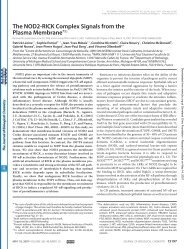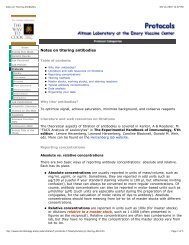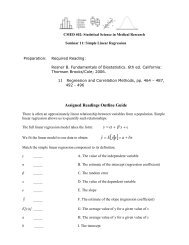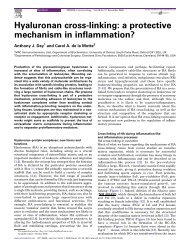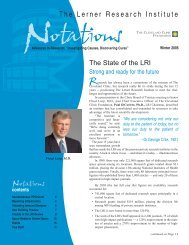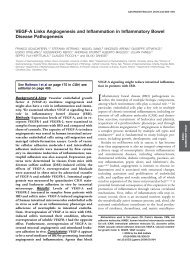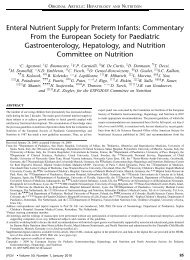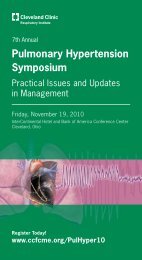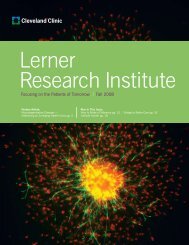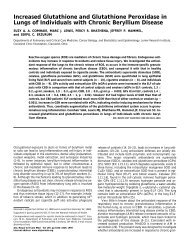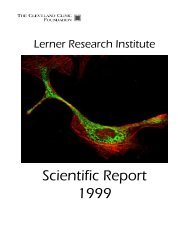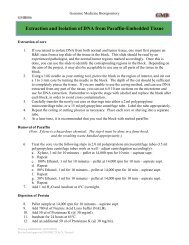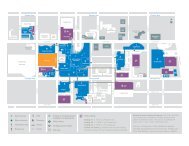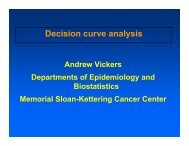Scientific Report 2003-2004 - Cleveland Clinic Lerner Research ...
Scientific Report 2003-2004 - Cleveland Clinic Lerner Research ...
Scientific Report 2003-2004 - Cleveland Clinic Lerner Research ...
- No tags were found...
Create successful ePaper yourself
Turn your PDF publications into a flip-book with our unique Google optimized e-Paper software.
The Department of Cancer BiologyEnteric Pathogen RegulatesNF-κB Activationof Inflammatory AgentsPathogenic stimulation of the nuclearfactor-κB transcription factor (NF-κB)family of proteins leads to the activationof numerous proinflammatory agents. Expressionof cytokines, chemokines, cellular adhesionproteins and immunoreceptor genes that arerequired for inflammation is dysregulated innearly all cases of chronic and debilitatingdiseases. In our laboratory, we contend thatpathogens are responsible for disrupted signaltransduction pathways, which result in errantimmune response gene expression.Our hypothesis states that pathogenicstimuli commandeer and use normal cellularsignal transduction pathways. Those pathogensusurp the normal control points in the flow ofinformation from the extracellular environmentand the cell membrane to the nucleus.Dysregulated gene expression of inflammatorymediators results in aberrant expression ofinflammatory response genes.Intestinal epithelial cells serve as our modelsystem. We are studying the regulation of the NFκBtranscription factor in response to invasion ofthese cells by pathogenic enteric bacteria. We areusing a variety of biochemical and reverse genetictechniques to precisely interfere with discretesteps in the activation pathway(s) used byproinflammatory cytokines. We are comparinghow this interference affects the signalingpathways activated by the pathogens.Identification of key control nodes alongthe pathogenic signaling pathways will aid in thedevelopment of pharmaceutical compounds thatcan block pathogenic signaling but leave the cell’snormal signal transduction pathways largelyunaffected. Such pharmaceuticals will beextremely useful in the treatment of manychronic inflammatory diseases, such as inflammatorybowel disease, rheumatoid arthritis andnumerous autoimmune and neurodegenerativediseases. Recently, we have identified a patternrecognition receptor on intestinal epithelial cellsthat recognizes bacterial flagellin protein. Therecognition of flagellin by Toll-like receptor 5leads (TLR5) to NF-κB activation and proinflammatorygene expression. Current projectsin the laboratory focus on understanding themolecular interactions and signaling properties ofTLR5 and other TLR family members and theirrelationship to inflammation. Recently, with Dr.Amiya K. Banerjee’s laboratory in CCF’s Sectionof Virology, we have identified a TLR-mediatedpathway of NF-κB activation that recognizesproteins from the medically important humanparainfluenza virus (HPIV3). HPIV3 is a majorcause of lung-related morbidity and disease innewborns, young infants and immunologicallysuppressed individuals. Activation of NF-κB viathis pathway causes the virus to be mildlycytotoxic, whereas blocking the activation ofNF-κB turns the virus infection into a virulentone. In addition, this pathway identifies a novelNF-κB-mediated anti-viral innate host defensesystem.Additional projects in the laboratory focuson identifying structural features of the I-κBkinase (IKK) protein complex that are associatedwith its inactive and active states. IKK is thecentral regulator of NF-κB activation in cells inresponse to a wide variety of cell stimuli. Otherstudies are designed to identify amino acidresidues within the IKK complex that are triggerpoints for IKK activation by other upstreamkinases. Once the structural features of theactive IKK complex and identification of keyactivation amino acid residues and upstreamkinases have been identified, they will serve asexcellent potential drug targets for therapeuticintervention.THE DIDONATOLABORATORYPROJECT SCIENTISTLouis Liou, Ph.D., M.D.Urological Inst., CCFRESEARCH ASSOCIATETing Shi, Ph.D.POSTDOCTORAL FELLOWSNiladri Kar, Ph.D.Thomas Tallant, Ph.D.Provash Sadhukhan, Ph.D.GRADUATE STUDENTJoseph Lupica, B.A.Joseph A. DiDonato, Ph.D.DiDonato, J.A., Hayakawa, M., Rothwarf, D.M., Zandi, E., and M. Karin (1997) A cytokine-responsive IκBkinase that activates the transcription factor NF-κB. Nature 388:548-554.Zamanian-Daryoush, M., Mogensen, T.H., DiDonato, J.A., and B.R. Williams (2000) NF-κB activation bydouble-stranded-RNA-activated protein kinase (PKR) is mediated through NF-κB-inducing kinase and IκBkinase. Molec. Cell. Biol. 20:1278-1290.Purcell, N.H., Yu, C., He, D., Xiang, J., Paran, N., DiDonato, J.A., Yamaoka, S., Shaul, Y., and A. Lin(2001) Activation of NF-κB by hepatitis B virus X protein through an IκB kinase-independent mechanism.Am. J. Physiol. Gastrointest. Liver Physiol. 280:G669-G677.DiDonato, J.A. (2001) IKK alpha on center stage. Science STKE [Electronic Resource: Signal TransductionKnowledge Environment]. 2001(97):PE1.Rani, M.R., Asthagiri, A.R., Singh, A., Sizemore, N., Sathe, S.S., Li, X., DiDonato, J.D., Stark, G.R., andR.M. Ransohoff (2001) A role for NF-κB in the induction of β-R1 by interferon-β. J. Biol. Chem.276:44365-44368.53



